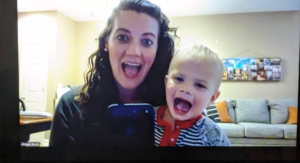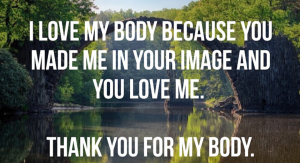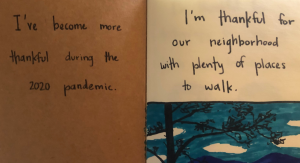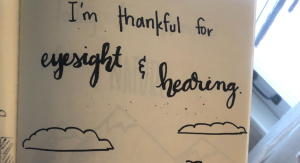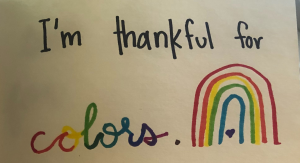 To say that gratitude has changed my life could seem cliché, but from the time I read a book called Choosing Gratitude by Nancy DeMoss Wolgemuth, I have never been the same. I picked it up after the hardest tragedy in our married lives, the death of Bradley’s courageous mother. Joan fought an 18-month battle to pancreatic cancer. We were newlyweds when she was diagnosed, and after her diagnosis our family’s priorities narrowed down to maintaining our jobs and spending every minute we could with her. Needless to say, Choosing Gratitude is not the kind of book one would naturally pick up when grieving the loss of a parent.
To say that gratitude has changed my life could seem cliché, but from the time I read a book called Choosing Gratitude by Nancy DeMoss Wolgemuth, I have never been the same. I picked it up after the hardest tragedy in our married lives, the death of Bradley’s courageous mother. Joan fought an 18-month battle to pancreatic cancer. We were newlyweds when she was diagnosed, and after her diagnosis our family’s priorities narrowed down to maintaining our jobs and spending every minute we could with her. Needless to say, Choosing Gratitude is not the kind of book one would naturally pick up when grieving the loss of a parent.

Gratitude is not some platitude that we just talk about during the month of November; it has the power to change your outlook on life. As I worked through the numbness of loss, I also found new things to be thankful for. This was a daily choice. Over time, it got easier and then became a habit.
Choose to Battle
I also chose to battle negative self-talk when I looked in the mirror, especially in these years after having a child. Once, I even wrote on my mirror “I am thankful for my body. I am fearfully and wonderfully made. Thank You for my body.” I have become increasingly thankful that works equipped with the reassurance that I am younger today than I ever will be. I said these phrases for a month, and believe it or not, I have now erased it off my mirror because I don’t have nearly the amount of negative self-talk I used to.
Gratitude has become a habit, especially after having a kid and a pretty traumatic pregnancy that involved all of the following:
- preeclampsia
- Intrauterine Growth Restriction (IUGR)
- 4 weeks in the hospital on bed rest
- a placental abruption during labor
- one week in the NICU
Now, I’m just thankful for every single normal body function for me and that my son is completely fine following labor!
Powerful Words
Once gratitude became a habit, I realized several new things about myself. Believe it or not, my favorite holiday is Thanksgiving. If you have a chance to read up on how Thanksgiving became a national holiday, look no further than the historical woman author, Sarah Hale, who wrote “Mary Had a Little Lamb.” She lobbied for women’s public education and petitioned multiple presidents to nationalize the holiday, until, influenced by Hale, President Lincoln did so in 1863.
Upon the realization of my favorite holiday, I soon found myself saying my new favorite words, “thank you” every chance I got. I found that these two common words have the power to make workers feel appreciated, strengthen marriages, and make our everyday actions, even those of young children, seem valuable. “Thank you” has the power to build relationships and bridge opposing positions, especially when someone takes the time to share their opinion and the other takes the time to listen to understand. Gratitude has the power to unify!
Gratitude also has the power to battle discontentment. It takes away our tendency to make comparisons. Through it, we get power to battle envy, slander, gossip, and complaining. It has the power to make someone’s day better, which brightens the day of at least two people.
Secret of Life
My students and I have a lot of “character conversations” when learning opportunities come up. These often involve young children who make mistakes and do things that other children may not like. I choose to view these conflicts as opportunities to teach my children how to be successful in life. Also, I call them “a secret of life” and make it seem like a powerful secret when I share it with them. I say things like, “if you’re having a bad day, list the things that you’re thankful for, and don’t stop there. Find someone who may be having an even worse day than you, and find a way to make their day. Suddenly you’ll find that your mood is lifted and your day just had the sun rays break through the gray rain clouds.”
“Paying it forward,” or finding ways to appreciate and encourage others, is delightful. It’s joy-giving. My life is one in which I find such joy in giving whatever I can, however I can, to whomever I can. It’s easy to think of ways to encourage others once you get started. Maybe it starts with the words, “thank you for (list specific action),” and builds to a handwritten note. Maybe the handwritten note becomes a little “happy gift” for no reason. Then, the happy gift becomes a nicer gift. Maybe your priorities change and you start budgeting for ways to “pay it forward” and share gifts with others. This can become a continuous cycle of joy in giving courage and hope, and receiving it back in abundant measure.
Science and “Self Care”
Yes, gratitude has changed my life, but it’s not alone. I’m no doctor, but there are ways to boost the “happiness levels” in your brain. There’s a lot we can learn about the “happy” hormones, serotonin, dopamine, and endorphins. Anyone who’s watched Elle Woods in Legally Blonde has heard of the link between exercise and endorphins. “Exercise gives you endorphins. Endorphins make you happy. Happy people just don’t shoot their husbands, they just don’t.”
So what does gratitude have to do with mental health? You have to fight for it. It is a choice to find the good and to think about what you are thankful for. You also have to fight for your mental health, or as many say today, “practice self care”. Those words are easy to say unless there are actions that prove “self care” is a priority.
You have to fight for your future health. It’s not hard to figure out how to live a healthy life; however, it can be incredibly hard to be disciplined enough to consistently choose to live a healthy life. What we eat, what we say, what we do, how we sleep, what we drink, how we talk, habits of thinking, and who we are around affect our brain. This, in turn, affects our physical and emotional health.
Raise Your Heart Rate to Manage Stress
In addition to a habit of gratitude, paying it forward, and choosing to be self-disciplined (within reason) with our family’s diet and lifestyle choices, we also try to exercise. It takes everything in me to actually take care of myself and my needs (not to mention my family’s). Exercising is one way to do that. It looks different every year.
Before my son came along it was easy to plan ahead, pack a change of clothes and go to the gym after work. After my son came along, I joined a gym with childcare. My son was with me teaching exercise classes on Facebook live during the pandemic (despite the state of my living room). While my gym was closed, I was thankful that my son was happy to go on long stroller hikes (accompanied with snacks, toys, and books), and I was very grateful to live in a neighborhood where we could go on 3 mile walks twice a day when everything shut down.
I am continually thankful for my husband and parents who take care of my son so that I can still go on a hike or a run. It’s a sacrifice—for my family and myself. It’s not easy, but exercise does boost endorphins. While some could look on with disdain that the way I have to prioritize my health seems selfish, please keep in mind that I am fighting for my health with a commitment to a good diet and regular exercise. And trust me, with those endorphins, I’m not the only one who is living a happier, grateful life; my family, my students, and my friends are, too. I’m sure that those who are around me are more thankful to be around me in a good mood, which only comes after I’ve fought for these things (which improves their quality of life, too)!
